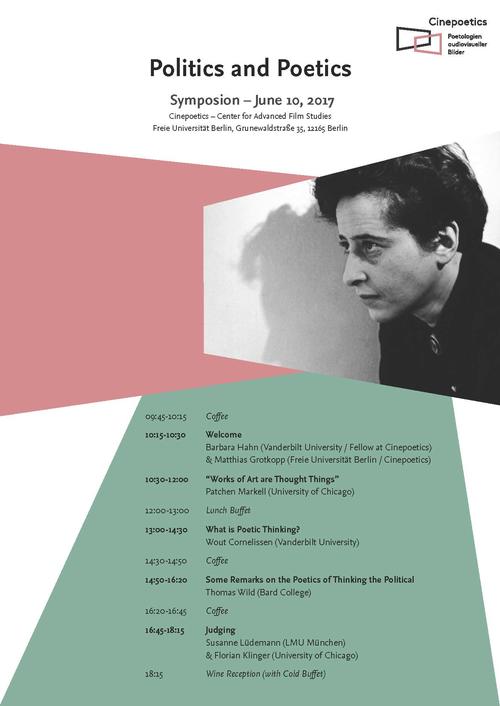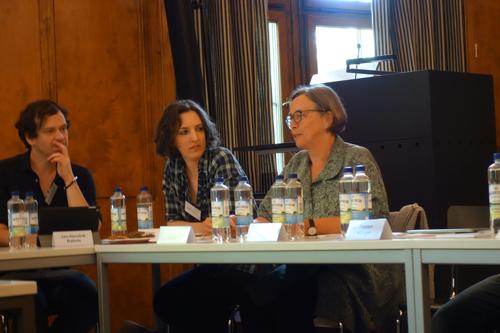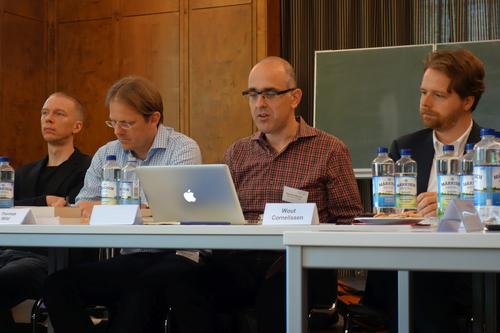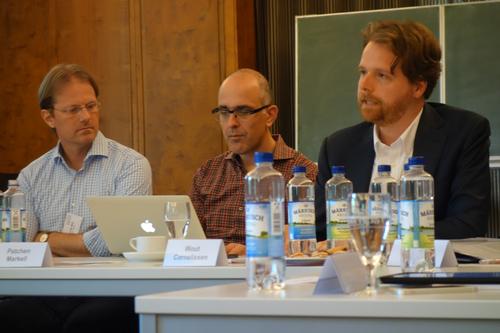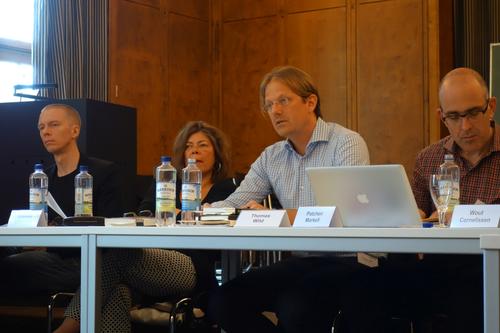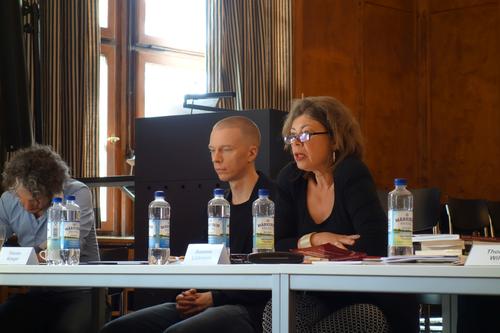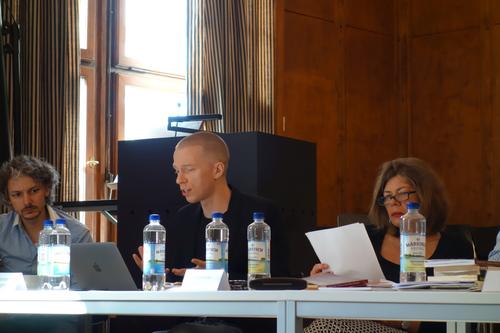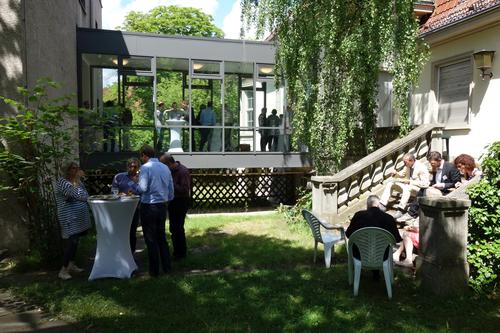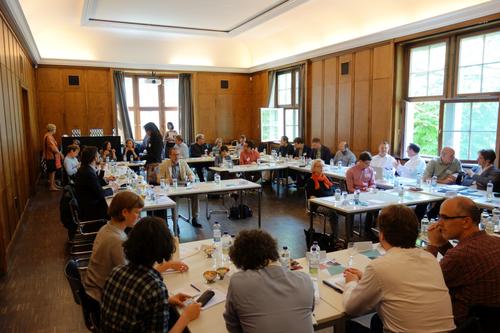Politics and Poetics
10.06.2017 | Symposion der Kolleg-Forschungsgruppe Cinepoetics u.a. mit Wout Cornelissen, Thomas Wild und Susanne Lüdemann.
28.06.2017
As a fitting conclusion to this summer's research focus, the second Cinepoetics Symposion focused on the dynamic relationship between politics and poetics. The event's theme was based on our assumption that this relation can neither be described as a strict separation nor as a causal or functional connection. Instead one might suggest that both are related to what one could call the figuration of the limits and fault lines of a shared perception of the world, a shared feeling for the common.
With politics and poetics being at the center of Hannah Arendt's work, it seemed only logical to seize the chance to work with leading experts on the theorist's writing. After all, it was Arendt who once called the faculty of judgment, in its relation to thinking, "the most political of men’s mental abilities" (The Life of the Mind, 192).
The meeting of 30 editors preparing the upcoming critical edition of Hannah Arendt's works, which was organized by the Cinepoetics group and our fellows, presented a fertile ground for the discussion of Arendt’s work concerning the group’s research perspective. Among the distinguished speakers were Patchen Markell (University of Chicago), Wout Cornelissen (Vanderbilt University), Thomas Wild (Bard College), Susanne Lüdemann (Ludwig-Maximilians-Universität München), and Florian Klinger (University of Chicago).
After welcoming words by Matthias Grotkopp, who explained the theoretical background of Cinepoetics and the concept of thinking films as creating the world, Cinepoetics fellow Barbara Hahn also expressed her gratitude to all participants. The symposion could be seen as "the happy marriage of an unlikely couple," Hahn said. At first glance, Cinepoetics and the critical edition of Arendt’s works might not seem to harmonize perfectly but the discussions over the summer – as well as the one at hand – have shown otherwise. Hahn also stressed the relevance of Hannah Arendt these days, as her book on totalitarianism became a bestseller in theoretical writings after Donald Trump was elected as President of the United States.
In the first presentation of the day, "Works of Art are Thought Things", Patchen Markell talked about the closeness of poetics and politics in regard to a shared perception of the world. Following Hannah Arendt, poiesis must be understood as "the production of a home to thought," Markell explained. This is also at the center of Arendt's scholarly interest as, according to her, the activity of thinking is as relentless as life itself.
Thinking is understood here as a mediating activity that transforms 'unworldly things'– labour and feeling among others – into something that is 'ready for the world'. We are then able to grasp a certain materiality in thought, which is more than just thought materialized in text. Materialized thinking lets us understand the brain as an organ that contrasts the imminent growth of 'machinic' artificiality.
Wout Cornelissen's presentation revolved around the central question "What is Poetic Thinking?" He explored this by closely looking at Hannah Arendt’s essay on Walter Benjamin, in which we can see a liberating movement from an instrumental view towards thinking. In examining the rift between thinking and action – which Arendt situates in the Socratic School – one has to discern three different 'types' of thinking. Dialogical thinking is to be understood as one's soundless conversation with oneself and judgment in relation to public appearance, whereas representative thinking is the capacity for an "enlarged mentality" (erweiterte Denkungsart) that that imagines and makes present what one would feel and think in the place of those who are absent. Poetic thinking then describes the making in thinking, which is why Arendt calls Benjamin neither a philosopher nor a poet, but a poetic thinker.
The importance of this 'type' of thinking shows when it comes to metaphor. It is capable of materializing the invisible through the correspondence of two things, Cornelissen explained, and thus lets us experience the 'oneness' of the world. "Thinking poetically," with Benjamin as an important example, can mold a different approach to the basic philosophical question "What is X?"
With regard to the research context of Cinepoetics, it is noteworthy that Arendt describes how the capacity of "thinking poetically" comes from a passion for the particular, an ability to conceive of and separate a part from the whole – which also seems intrinsically connected to aesthetic judgment. Thus, it is possible to draw a line from aesthetic judgments to the creation and appropriation of specific poetic 'image spaces,' as Arendt demonstrates for example in the preface to Between Past and Future: Here, a parable by Kafka is described as recording "something which one may call a thought-event" that can only be comprehended by following the spatial imagination, the "thought-landscape," provided by the story.
As central to Hannah Arendt's project, Thomas Wild qualified the question for the existence of non-tyrannical thinking. For clarification, his presentation "Some Remarks on the Poetics of Thinking in the Political" focused on the relationality of thinking in Arendt. She must be understood as an 'and-thinker' rather than a 'because-thinker,' he explained, although this distinction itself is not exclusive but relational. It is this relation, in the Arendtian Dazwischen, where the Political unfolds. Describing a transition from thinking to judging when the public sphere comes into play, Wild claimed that judging is the realization of thinking.
This transition holds political significance when it is not understood in terms of the subject but in terms of the world. To make this concept more graspable, Wild referred to a quotation by Karl Jaspers: "Die Wahrheit beginnt zu zweien." Thus, truth can only emerge from duality, which means two persons as well as the mere distinction between the subject and 'the Other' – or as Arendt writes: "It's the difference inserted in my oneness."
Last but not least, Susanne Lüdemann and Florian Klinger dedicated their shared presentation to the topic of judging. Lüdemann situated Arendt’s work on judgment mostly in the 1950s and onwards. To be able to grasp her notion of judgment, Lüdemann took three aspects into account: Schreibweisen and Verfahren – writing styles and techniques – form the base for this notion, but are not to be confused with literary methods of any kind. Secondly, the understanding of Kant's Critique of Judgment becomes the center of interest, as Arendt describes it in her Kant Lectures.
The third and most important aspect is the practice of judgment in modernity, which incorporates a crisis or rupture in the aftermath of the holocaust, as Arendt describes it. These three aspects are to be seen as a heuristic approach to judging as a procedure, Lüdemann noted. It is an emancipation of the capacity of judgment from method or what Arendt calls "thinking without bannister," concerning the quality of one's thought.
In Florian Klinger's terms, judgment can never be anything else than performance. He described it as the unity of force and content. The political then would not refer to a certain subject matter, but to a form of (lived) thinking. "This form of thinking becomes the subject matter of thinking (of which judgment is the form)," as Klinger pointed out. A constant contextualization – an apprehension that thinking is taking place – becomes the 'goal' of thinking.
Klinger elaborated that this is the base of a certain 'poetic consciousness' in Hannah Arendt's work. The priority of performative aspects in her thinking against the contemplative shows how judgment creates its own context as well as the underlying transformative power.
Each presentation sparked lively discussions among the members of Cinepoetics and the participants of the editors meeting. A productive and respectful atmosphere during lunch and coffee breaks brought this "unlikely couple," to quote Barbara Hahn, closer together.
This created useful links to the notion of aesthetic judgment, which is of special interest for Cinepoetics: In her attempt to recover Kant's unwritten political philosophy from his Critique of Judgment, Arendt connected the plurality of the human as one of the conditions of aesthetic judgment to the fundamental principals of political action. The validity of a judgment of taste is based in its appeal to the sensus communis that complements one’s private sensations with a claim to hold for all those with whom one proposes to share a community and a common access to the world.
In her lectures on Kant, Arendt connects the capacity of judgment with an imaginary space that is potentially public, producing a kind of generality that is not the "generality of the concept," but "closely connected with particulars, with the particular conditions of the standpoints one has to go through in order to arrive at one's own 'general standpoint'" (Lectures on Kant’s Political Philosophy, 43f). What seems to be crucial and what we want to develop further in our discussion is that this general standpoint is deduced from the judgment of taste.
As such, the general standpoint of aesthetic judgment is neither an ideal, perfected position nor is it the practical consensus of a given community. Rather, the experience of a multitude of particularities in taste – exemplified by the variety of generic communities, distinctions and subcultures – becomes a way of expressing the contingent formation and the limits of one’s "enlarged mentality." Therefore we want to explore ways to connect the account of the sensus communis to the plurality and the historical transformations of genre poetics, that is, to the relationship between aesthetic modes and modalities and the historical transformation of divergent conceptions of reality. Is it possible to use the judgment of taste as an entry to investigate the relation between politics and poetics?
With this way of describing poetics, one central paradigm of Cinepoetics is invoked, namely that the creation of divergent versions of reality in cinematic images can be grasped as a way of thinking. This way of thinking is not expressed in concepts or syllogisms but in the audiovisual space-time figurations that interweave sensual, cognitive and affective processes.
"Thinking poetically" lays claim to a unique form of general validity beyond the coerciveness of logical reasoning and the kind of generality claimed by (unexamined) common sense. What is up for debate is whether Arendt's ideas can productively be put into dialogue with media theories, which conceptualize the coupling of sensual perception, affect dynamics and cognitive processes as a mode of thinking. Can we extend the characterization of being an "experience in thinking" from texts like Kafka's and Benjamin's to certain poetics of cinematic images? In light of Arendt's understanding of aesthetic judgment as a genuinely political ability that presupposes this very experience, we want to further explore the ways her writing may provide us with a fruitful starting point for thinking about the relation between politics and poetics.
Indeed, each presentation held at the symposion sparked lively discussions among the members of Cinepoetics and the participants of the editors meeting. In the end, a productive and respectful atmosphere during lunch and coffee breaks brought this "unlikely couple," to quote Barbara Hahn, closer together.
